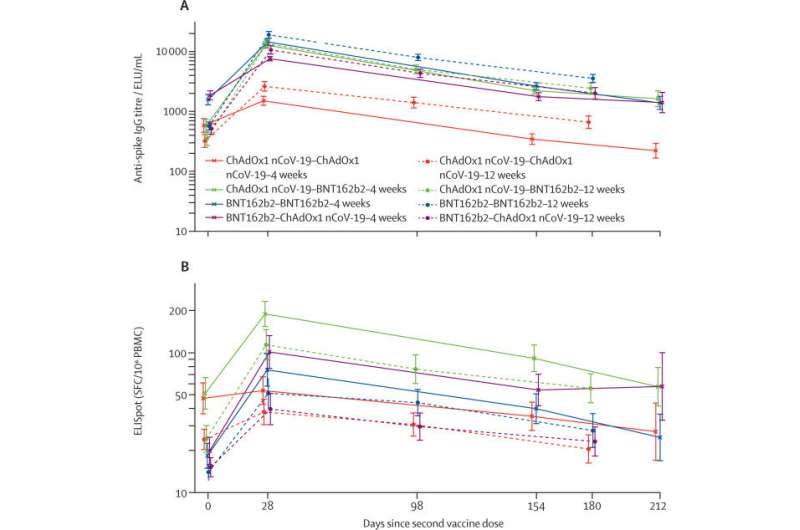

Researchers running the University of Oxford-led Com-COV study have reported the results of a study assessing the immune response and reactogenicity of two-dose vaccine schedules when administered at four-week and 12-week intervals, using the Oxford-AstraZeneca or Pfizer-BioNTech vaccines.
It is the first reporting randomized data looking at the effect of time interval and prophylactic paracetamol use for standard and mixed vaccine schedules using the Oxford-AstraZeneca and Pfizer-BioNTech vaccines.
In their paper published in The Lancet Respiratory Medicine, the researchers report that a standard two-dose Oxford-AstraZeneca or Pfizer-BioNTech schedule generated a greater increase in antibodies in participants when immunized at a 12-week interval compared with a four-week interval, and this persisted to six months following the second dose.
In mixed schedules, only Pfizer-BioNTech followed by Oxford-AstraZeneca recorded a significantly stronger immune response in the 12-week versus 4-week interval groups, and only at 28 days following a second dose. No safety concerns were raised in this study of 730 participants.
This study therefore supports flexibility in priming intervals across all vaccine schedules studied—this can be helpful in countries where vaccine supply may be inconsistent.
Matthew Snape, Professor in Pediatrics and Vaccinology at the University of Oxford, and Chief Investigator on the trial, said: “This paper summarizes data that have been made available to policy makers globally during the pandemic, providing vital information the impact of using short vs long intervals for a range of COVID-19 vaccine schedules. These data are relevant not only to COVID-19 vaccines, but also how future vaccines using mRNA and viral vectored platforms against different diseases may be best deployed.”
Researchers reported other key findings from the study:
- T-cell responses decayed faster in the 12-week interval groups than in the 4-week interval groups.
- Extending vaccination interval from four to 12 weeks greatly reduced the likelihood of short-lived vaccine reactions in volunteers who received Pfizer-BioNTech as a second dose regardless of the prime vaccine—by up to 80%.
- Prophylactic paracetamol had the greatest effect in reducing reactogenicity within the most reactogenic group—those receiving Pfizer-BioNTech followed by Oxford-AstraZeneca.
Source: Read Full Article